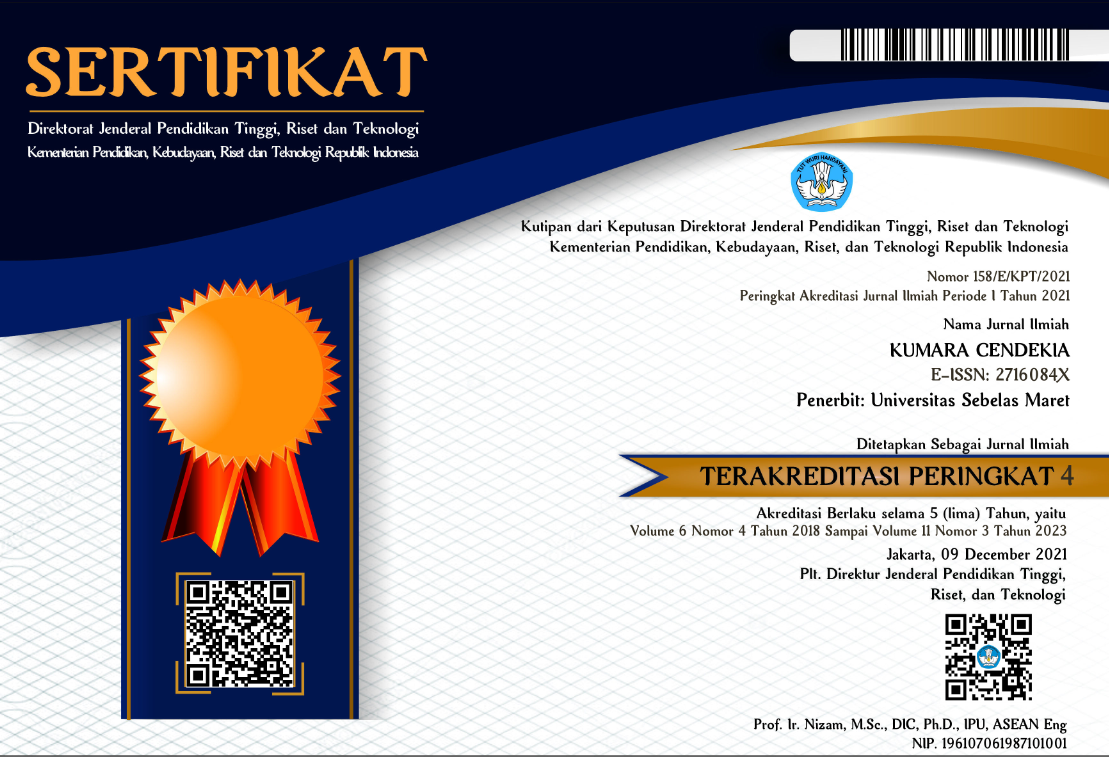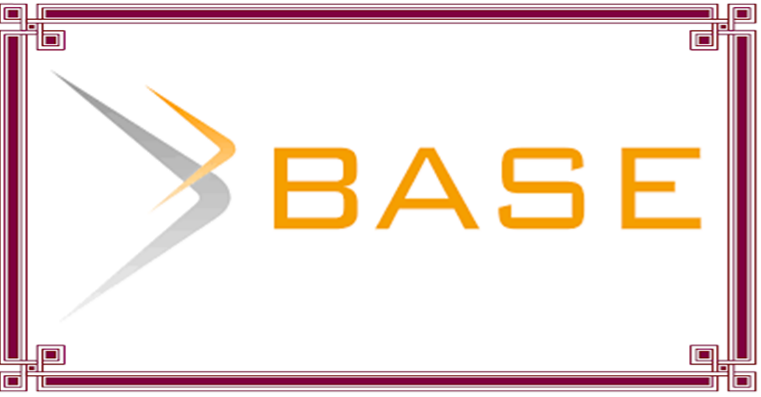EFEKTIVITAS BUILDING BLOCKS PROGRAM TERHADAP KOMPETENSI NUMERIK ANAK USIA 5-6 TAHUN
Abstract
ABSTRAK
Penelitian true experiment ini bertujuan untuk menguji efektivitas building blocks program terhadap kompetensi numerik anak usia 5-6 tahun. Sampel yang digunakan peneliti berjumlah 42 anak di TK Negeri Pembina Jebres dengan teknik pengambilan sampel random assigment. Teknik pengumpulan data melalui tes untuk mengukur komptensi numerik anak. Uji normalitas dan homogentias menggunakan kolmogorov smirnov dan levene test for equality of variance. Uji hipotesis dengan independent sample t-test. Hasil analisis data menunjukkan bahwa pertama, adanya peningkatan, nilai rata-rata pretest kelompok eksperimen dari 19,57 meningkat menjadi 27,48 pada saat posttest, dan nilai rata-rata kelompok kontrol meningkat dari 20,09 pada saat pretest menjadi 24,95 pada saat posttest. Kedua, terdapat efektivitas building blocks program terhadap kompetensi numerik anak usia 5-6 tahun (p ≤ 0,05). Hal ini dibuktikan melalui 16 dari 21 anak memiliki kompetensi numerik sangat baik yang mampu melafalkan nama angka 1-20 secara urut, menjumlahkan benda dengan benar, serta peningkatan pada indikator yang lain.
Kata Kunci : buidling blocks program, kompetensi numerik, anak usia dini
ABSTRACT
This true experment study aimed to test the effectiveness of building blocks program on the children numerical competence aged 5-6 years. The sample used by researchers consist of 42 children in the TK Negeri Pembina Jebres with random assignment sampling technique. Data collection techniques through test to measure the ability of children numerical competence. Normality and homogeneity tes used kolmogorov smirnov and levene test for equality variance. Test the hypothesis used independent sample t-tes. The result of data analysis showed that first, there was an increase in the average prestest score of the experimental group from 19,57 increased to 27,48 at the time of posttest, and the control group average score increased from 20,09 at the time of pretest to 24,95 at the time of posttest. Second, there is effectiveness of building blocks program on the children numerical competence aged 5-6 years (p ≤ 0,05). It was prove through 16 out of 21 children of the experimental group having very good numerical competencies who are able to recite the numbers 1-20 in order, subtract the object well, and there was an increas in other indicators.
Keywords : building blocks program, numerical competence, early childhood
Full Text:
PDFReferences
DAFTAR PUSTAKA
Beaty, J. J. (2013). Observasi perkembangan anak usia dini. Terj. Arif Rakhman. Jakarta: Kencana Prenadamedia Group.
Bojorque, G., Torbeyns, J., Van Hoof, J., Van Nijlen, D., & Verschaffel, L. (2018). Effectivennes of the building blocks program for enhancing ecuadorian kindergartners’s numerical competencies. Early Childhood Research Quarterly, Vol. 44, May, 2018, 231-241.
Clements, D. H., Fuson, K. C., & Sarama, J. (2017). The research-based balance in early childhood mathematics: a response to common core criticsm. Early Childhood Research Quarterly, Vol. 40, February, 2017, 150-162.
Clements, D. H., & Sarama, J. (2004). YoungcChildren in mathematics. New Jersey: Lawrence Erlbaum Associates Publisher.
Hamdayana, J. (2014). Model dan metode pembelajaran kretaif dan berkarakter. Bogor: Ghalia Indonesia.
Hardini, I. & Puspitasari, D. (2012). Strategi pembelajaran terpadu (teori, konsep, dan implementasi). Yogyakarta: Familia.
Kostelnik, M. J., Soderman, A. K., & Whiren, A. P. (2017). Kurikulum pendidikan anak usia dini berbasis perkembangan anak (developmentally appropriate practices). Terj. K. Anwar. Depok: Kencana.
National Research Council. (2009). Principle and standars for school mathematics. Reston, VA: NCTM.
Passolungi, M. C., Lanfranchi, S., Altoè, G., & Sollazzo, N. (2015). Early numerical abilities and cognitive skills in kindergarten children. Journal of Experimental Child Psychology, Vol. 135, March, 2015, 25-42.
Peraturan Menteri Pendidikan dan Kebudayaan Nomor 137. (2013). Standar nasional pendidikan anak usia dini. Jakarta: Kementerian Pendidikan dan Kebudayaan.
Phelps, P. C. (2012). Let’s build strong foundations in language, math, and social skills. Lewisville: Gryphon House, Inc.
Ramani, G. B., Zippert, E., Schweitzer, S., & Pan, S. (2018). Preschool children’s joint block building during a guided play activity. Journal of Applied Developmental Psychology, Vol. 35, Juni, 2014, 320-330.
Schmitt, S. A., Korucu, I., Napoli, A. R., Bryant, L. M., & Purpura, D. J. (2018). Using block play to enhance preschool children’s mathematics and executive function: a randomized controlled trial. Early Childhood Research Quarterly, Vol. 44, April, 2018, 181-191.
Schwartz, S. L. (2005). Teaching young children mathematics. Westport, CT: Praeger.
Smith, A.M., & Price, A.J. (2012). Mathematics in early years education. New York: Routledge.
Sujiono, Y. N. & Sujiono B. (2010). Bermain kreatif berbasis kecerdasan jamak. Jakarta: PT Indeks.
Suryani, N., & Agung, L. (2012). Strategi belajar-mengajar. Yogyakarta: Penerbit Ombak.
Refbacks
- There are currently no refbacks.












